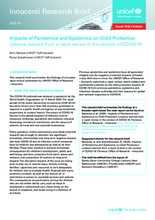Abstract
This research brief summarizes the findings of a rapid review that collates and synthesizes evidence on the child protection impacts of COVID-19 and previous pandemics, epidemics and infectious disease outbreaks. It provides lessons for global and national responses to COVID19 and recommendations for future research priorities.
The evidence on the impacts of pandemics and epidemics on child protection outcomes is limited and skewed towards studies on the effects of HIV/AIDS on stigma. There is also some evidence on the effects of Ebola on outcomes such as orphanhood, sexual violence and exploitation, and school enrolment, attendance and dropout. The evidence on other pandemics or epidemics, including COVID-19. is extremely limited.
There are various pathways through which infectious disease outbreaks can exacerbate vulnerabilities, generate new risks and result in negative outcomes for children. Outcomes are typically multi-layered, with immediate outcomes for children, families and communities - such as being orphaned, stigmatization and discrimination and reductions in household income - leading to further negative risks and outcomes for children in the intermediate term. These risks include child labour and domestic work, harmful practices (including early marriage), and early and adolescent pregnancy.
Lessons from previous pandemics and epidemics suggest that the following could mitigate the child protection risks:
- Responding to children in vulnerable circumstances, including orphans (e.g. through psychosocial interventions focused on improving mental health and community-based interventions that provide families with resources and access to services)
- Responding to stigmatization and discrimination (e.g. through information and communication campaigns and support from public health systems, communities and schools)
- Investing in social protection enables livelihoods during outbreaks and to counteract shocks
- Promoting access to health, protective and justice services, which may be restricted or suspending during infectious disease outbreaks
- Ensuring continued access to education, particularly for girls, who may be adversely affected
There is a high burden of proof for data collection during the current COVID-19 outbreak than there would be in normal circumstances. Evidence generation strategies during and after the COVID-19 crisis should consider rigorous retrospective reviews and building upon monitoring, evidence and learning functions of pre-existing programmes – particularly where there is ongoing longitudinal data collection. There should also be efforts to synthesize evidence from existing research on the effectiveness of interventions that respond to the key risk pathways identified in this review.
- The full report can be found here.
- Access the Evidence Gap Map on child protection and violence outcomes here.
- Access the study protocol here.
Learn more here.

